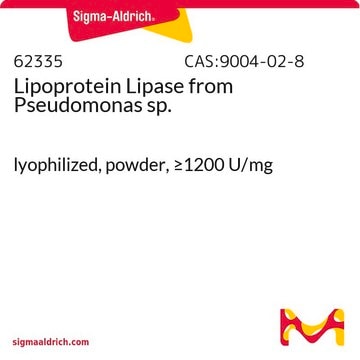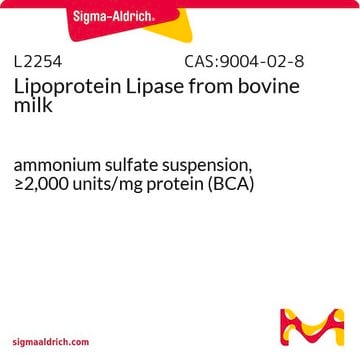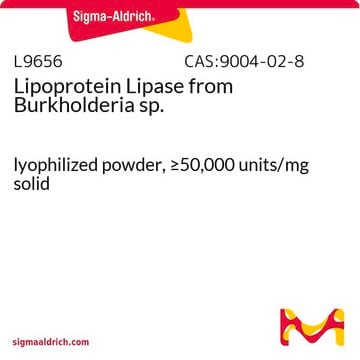62336
Lipoprotein Lipase from Pseudomonas sp.
lyophilized, powder, yellow-brown, ≥160 U/mg
Iniciar sesiónpara Ver la Fijación de precios por contrato y de la organización
About This Item
Productos recomendados
biological source
bacterial (Pseudomonas spp.)
Quality Level
form
powder
quality
lyophilized
specific activity
≥160 U/mg
color
yellow-brown
storage temp.
−20°C
¿Está buscando productos similares? Visita Guía de comparación de productos
Biochem/physiol Actions
Lipoprotein lipase belongs to the family of triglyceride lipases. It hydrolyses triglycerides in triglyceride-rich ApoB-containing lipoproteins.
Unit Definition
1 U corresponds to the amount of enzyme which liberates 1 μmol of oleic acid per minute at pH 8.0 and 37°C (cholesteryl oleate, Cat. No. 26850, as substrate)
Storage Class
11 - Combustible Solids
wgk_germany
WGK 3
flash_point_f
Not applicable
flash_point_c
Not applicable
ppe
Eyeshields, Gloves, type N95 (US)
Certificados de análisis (COA)
Busque Certificados de análisis (COA) introduciendo el número de lote del producto. Los números de lote se encuentran en la etiqueta del producto después de las palabras «Lot» o «Batch»
¿Ya tiene este producto?
Encuentre la documentación para los productos que ha comprado recientemente en la Biblioteca de documentos.
Joni Agustian et al.
Chirality, 24(5), 356-367 (2012-04-21)
Because chiral liquid chromatography (LC) could become a powerful tool to estimate racemic atenolol quantity, excellent enantiomeric separation should be produced during data acquisition for satisfactory observation of atenolol concentrations throughout the racemic resolution processes. Selection of chiral LC column
Karine Gontier et al.
Comparative biochemistry and physiology. Part A, Molecular & integrative physiology, 164(3), 499-505 (2013-01-03)
In waterfowl, the response to overfeeding differs from one genotype to the other. Pekin ducks generally store lipids in the peripheral tissues while Muscovy and mule ducks promote hepatic lipid storage. A possible reason for these various susceptibilities to hepatic
Q Renli et al.
Animal : an international journal of animal bioscience, 6(8), 1246-1252 (2012-12-12)
Experiments were conducted to determine the effects of Newcastle disease on chicken fat metabolism. Thirty black-bone chickens were infected intraocularly with the Newcastle disease virus (NDV). Six birds were killed at 0, 12, 24, 48 and 72 h post infection
Jonghan Kim et al.
FASEB journal : official publication of the Federation of American Societies for Experimental Biology, 27(4), 1657-1663 (2012-12-18)
Iron loading is associated with altered lipid metabolism, but underlying mechanisms remain unknown. We compared serum iron and triglycerides (TGs) in Belgrade rats, a genetic model of iron-loading anemia. Homozygous b/b rats had greater serum iron (68 vs. 28 μM;
Autocrine endocannabinoid signaling through CB1 receptors potentiates OX1 orexin receptor signaling.
Maria H Jäntti et al.
Molecular pharmacology, 83(3), 621-632 (2012-12-13)
It has been proposed that OX(1) orexin receptors and CB(1) cannabinoid receptors can form heteromeric complexes, which affect the trafficking of OX(1) receptors and potentiate OX(1) receptor signaling to extracellular signal-regulated kinase (ERK). We have recently shown that OX(1) receptor
Nuestro equipo de científicos tiene experiencia en todas las áreas de investigación: Ciencias de la vida, Ciencia de los materiales, Síntesis química, Cromatografía, Analítica y muchas otras.
Póngase en contacto con el Servicio técnico








